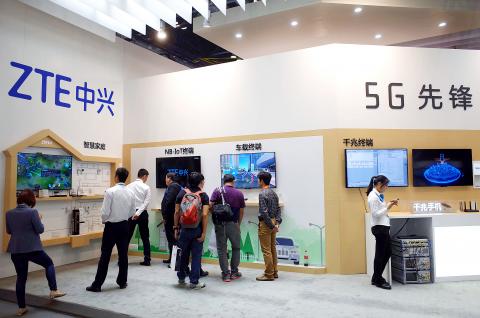Chinese telecom giant ZTE Corp (中興通訊) yesterday halted trading of its shares in Hong Kong and Shenzhen following a US ban on its purchase of sensitive technology, which drew a pledge by China to “safeguard” its companies if necessary.
Washington slapped ZTE with a seven-year ban on buying US-made chips and components as punishment for failing to follow through on pledges to punish staff responsible for illegal exports to Iran and North Korea.
However, the Chinese Minisry of Commerce said ZTE had created tens of thousands of US jobs.

Picture taken September 27, 2017 Reuters/Stringer
ZTE chairman Yin Yimin (殷一民) said the company had established a crisis team and was ready to “go to all lengths to face the crisis head-on.”
“We are in a complicated international situation,” Yin said in an open letter circulated online, adding that the company faces “twists and turns” abroad.
Following an investigation into the illegal sale of goods to Iran and North Korea, ZTE pleaded guilty in March last year to unlawful exports and was hit with US$1.2 billion in fines, the largest criminal penalty in US history in an export control case.
However, US Department of Commerce investigators said it made additional false statements multiple times about having taken action against the employees responsible when it had not.
In a statement on its Web site, the Chinese ministry said: “China has always asked Chinese enterprises to abide by the host country’s laws and policies and operate legally and properly in the process of overseas operation.”
“ZTE has launched extensive trade and investment cooperation with hundreds of American businesses, and contributes tens of thousands of jobs to the United States,” the ministry said, adding that it was “ready to take necessary measures to safeguard the legitimate rights and interests of Chinese enterprises.”
The five-year US government investigation into ZTE’s actions was first revealed in March 2016.
From January 2010 to March 2016, ZTE shipped US$32 million of US cellular network equipment to Iran and made 283 shipments of cellphones to North Korea, with the full knowledge of the highest levels of management, US officials said.
ZTE used third-party companies to hide the export of US components to the sanctioned countries, and then hid the information by “sanitizing databases” with information on the sales, they said.
The firm deleted e-mails of employees involved in the scrubbing of records and required employees with information about the illegal exports to sign non-disclosure agreements, they said.
It also covered up the fact that ZTE paid full bonuses to employees who had engaged in illegal conduct and failed to issue letters of reprimand, they said.

CARROT AND STICK: While unrelenting in its military threats, China attracted nearly 40,000 Taiwanese to over 400 business events last year Nearly 40,000 Taiwanese last year joined industry events in China, such as conferences and trade fairs, supported by the Chinese government, a study showed yesterday, as Beijing ramps up a charm offensive toward Taipei alongside military pressure. China has long taken a carrot-and-stick approach to Taiwan, threatening it with the prospect of military action while reaching out to those it believes are amenable to Beijing’s point of view. Taiwanese security officials are wary of what they see as Beijing’s influence campaigns to sway public opinion after Taipei and Beijing gradually resumed travel links halted by the COVID-19 pandemic, but the scale of

TRADE: A mandatory declaration of origin for manufactured goods bound for the US is to take effect on May 7 to block China from exploiting Taiwan’s trade channels All products manufactured in Taiwan and exported to the US must include a signed declaration of origin starting on May 7, the Bureau of Foreign Trade announced yesterday. US President Donald Trump on April 2 imposed a 32 percent tariff on imports from Taiwan, but one week later announced a 90-day pause on its implementation. However, a universal 10 percent tariff was immediately applied to most imports from around the world. On April 12, the Trump administration further exempted computers, smartphones and semiconductors from the new tariffs. In response, President William Lai’s (賴清德) administration has introduced a series of countermeasures to support affected

Pope Francis is be laid to rest on Saturday after lying in state for three days in St Peter’s Basilica, where the faithful are expected to flock to pay their respects to history’s first Latin American pontiff. The cardinals met yesterday in the Vatican’s synod hall to chart the next steps before a conclave begins to choose Francis’ successor, as condolences poured in from around the world. According to current norms, the conclave must begin between May 5 and 10. The cardinals set the funeral for Saturday at 10am in St Peter’s Square, to be celebrated by the dean of the College

CROSS-STRAIT: The vast majority of Taiwanese support maintaining the ‘status quo,’ while concern is rising about Beijing’s influence operations More than eight out of 10 Taiwanese reject Beijing’s “one country, two systems” framework for cross-strait relations, according to a survey released by the Mainland Affairs Council (MAC) on Thursday. The MAC’s latest quarterly survey found that 84.4 percent of respondents opposed Beijing’s “one country, two systems” formula for handling cross-strait relations — a figure consistent with past polling. Over the past three years, opposition to the framework has remained high, ranging from a low of 83.6 percent in April 2023 to a peak of 89.6 percent in April last year. In the most recent poll, 82.5 percent also rejected China’s